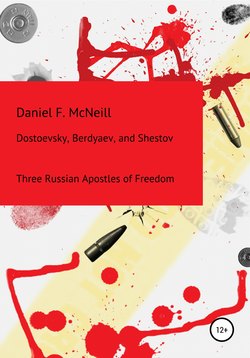Читать книгу Dostoevsky, Berdyaev, and Shestov. Three Russian Apostles of Freedom - Daniel Francis McNeill - Страница 7
Part One
Dostoevsky
7
ОглавлениеIn one of his early novels published in 1846, The Double, his hero Mr. Golyadkin, a minor government official, discovers the appearance of another Mr. Golyadkin, another being exactly like himself. At the beginning of the novel before his double appears, he consults a doctor because he feels mentally unbalanced. It is natural to think as his strange story develops that he loses his reason. In reality he never loses his reason and he becomes more and more unbalanced and delirious because he is horrified that he is losing not his reason but his self. His self appears to him in a form exactly like himself in every detail, as a living foreign himself exactly like himself. His double arrives on the scene and this other alien self that is also himself becomes more dominant in their relations with one another than himself. Reason is always able to guide us to some logical and practical end. We feel it is a necessary integral part of our normal behavior that helps us directly. But when our imagination runs wild for some unknown reason, when our emotions start going berserk and we appeal to our reason, we find that our reason is still present but is indifferent to our trouble and of no help. Mr. Golyadkin’s reason tells him with indifference that he is the real Mr. Golyadkin and that the other Mr. Golyadkin is also the real Mr. Golyadkin. Reason does not abandon the poor man at all and merely remains a useless presence in his mind indifferent to the delirious state of his feelings. As the other false Mr. Golyadkin becomes more and more dominant and as the reason of the real Mr. Golyadkin is without any power to distinguish between the two and establish who is real and who is unreal, the feelings of the original Mr. Golyadkin go more and more berserk as he begins doubting that he is in fact real. He is forced to enter a mental hospital. His double walks behind the carriage bringing the original Mr. Golyadkin to his new home and as he arrives there, disappears. Dostoevsky’s message is that Raskolnikov’s self, Mr. Golyadkin’s self, our selves may not be real. Our reason allows our imagination to create a self for ourselves and on our journey through life we must carefully keep presenting our invented self to others in a conventional package with few deviations. We feel comfortable with ourselves because other selves around us accept our invention of our self as real. Poor Mr. Golyadkin can not feel authentic facing his double’s invention of himself because it is in fact himself and only he should have the right to invent himself! By way of contrast, Sonya’s self is barely imaginable to herself. The self she constructed for herself naturally has been humiliated, crushed, destroyed. The world will no longer let her invent, it will only let her be. But normal being causes her suffering that is relieved only by the secret treasure she feels living in her heart. Unfortunately Raskolnikov and Mr. Golyadkin, who care nothing for the life of the heart, must rely only on themselves for strength and they discover that their inventions of themselves are not as reliable as they think.
The young Dostoevsky wrote The Double around the age of 25, two or three years before he received his second pair of eyes. As he stood before rifles pointed at him waiting for death, his reason at last allowed his imagination to abandon completely its duty to invent a self adapted to the selves of our world and let it go free to invent a self suitable to any world at all. A self for any world! But why not a self that did not fit in any world and that did not even need to make rational sense as a self? Bullets would fly at him in a few moments and when they arrived he would no longer have time or being or mind. The ground below his feet in seconds would no longer feel like ground. He would be timeless and groundless and his mind would no longer be able to pretend that rational forms of behavior were the only true basis of his true self.
